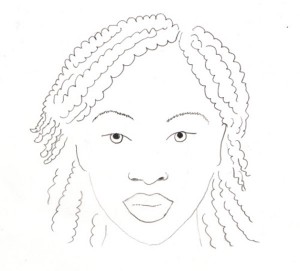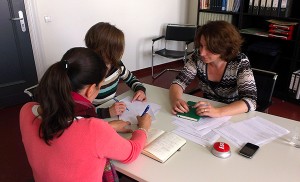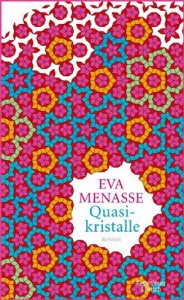Names have meanings. They project the hopes, dreams, and aspirations of fathers and mothers, they follow trends, and foretell the future of their bearers. For Jews many decisions are connected to the naming of a child: should the name reveal his or her religious affiliation, only be recognizable to other Jews, or neither? Will it be a name native to the family’s country of origin or to the child’s country of birth? Has the name been translated? Does it memorialize someone? Colleagues and friends of the Jewish Museum Berlin share their thoughts with this blog, on this and other questions.
Naomi
 My name means “pleasant” in Hebrew, and pleasantly inconspicuous it was in North America of the mid-1970s, where I was born. Naomi ranked neither among the fashionable names like Jennifer, Amy, Melissa and Heather, nor was it as unusual as the names given to the other flower-children of my generation, such as Blossom, Charisma, Summer, or Echo.
My name means “pleasant” in Hebrew, and pleasantly inconspicuous it was in North America of the mid-1970s, where I was born. Naomi ranked neither among the fashionable names like Jennifer, Amy, Melissa and Heather, nor was it as unusual as the names given to the other flower-children of my generation, such as Blossom, Charisma, Summer, or Echo.
Referring to the Biblical story of Ruth and Naomi, the name is popular among Jews. → continue reading
The Blog’s Editorial Staff in Discussion (Part II)

Meeting of the website editors
© Jewish Museum Berlin, photo: Michael Butschkau
Naomi Lubrich: We recently talked together about Eva Menasse’s novel Quasicrystals but we haven’t decided which of us will write a review of the book for our blog. Personally I would be interested in doing it, and I have something to say not only about the Jewish theme but also about Menasse’s image of women, that I found to be unrealistically and ideationally drawn. Xane is a downright caricature of a “high-powered woman”: a caring mother and stepmother of three children with, to some extent, behavioral problems. And at the same time she’s a leading film artist and influential intellectual. On top of all this she has a harmonious, uncomplicated marriage, and she even gets involved with a number of other men… → continue reading
A Talk about Jewish Questions, the Lives of Women, and Expectations of Literature
 This blog is edited by three women, all of whom are between their mid-30s and 40. They all studied literature, and try to reconcile to one another their commitment to their profession, their interests, and their private lives. At the center of the latest novel by Eva Menasse, Quasikristalle (2013, ‘Quasicrystals’), is Xane Molin, an at first younger, and then progressively older woman trying to square her career with her wish to be there for her children and to live a good life. In each chapter Quasicrystals takes a different look at her life – and we take different looks at the novel in our discussion here.
This blog is edited by three women, all of whom are between their mid-30s and 40. They all studied literature, and try to reconcile to one another their commitment to their profession, their interests, and their private lives. At the center of the latest novel by Eva Menasse, Quasikristalle (2013, ‘Quasicrystals’), is Xane Molin, an at first younger, and then progressively older woman trying to square her career with her wish to be there for her children and to live a good life. In each chapter Quasicrystals takes a different look at her life – and we take different looks at the novel in our discussion here.
Mirjam Bitter: Since in German substantives referring to persons are not gender-neutral, I re-named our blog’s literature series from the masculine “junge jüdische Autoren”, in more gender-neutral German, to “junge jüdische Autorinnen und Autoren,” that is, “young Jewish women and men authors.” In doing that, it occurred to me that, so far, we have only talked about male authors. What do you think about introducing a woman next?
Mirjam Wenzel: I’m reading Quasicrystals at the moment, by Eva Menasse, and I’m curious what you all think about the book. → continue reading
 My name means “pleasant” in Hebrew, and pleasantly inconspicuous it was in North America of the mid-1970s, where I was born. Naomi ranked neither among the fashionable names like Jennifer, Amy, Melissa and Heather, nor was it as unusual as the names given to the other flower-children of my generation, such as Blossom, Charisma, Summer, or Echo.
My name means “pleasant” in Hebrew, and pleasantly inconspicuous it was in North America of the mid-1970s, where I was born. Naomi ranked neither among the fashionable names like Jennifer, Amy, Melissa and Heather, nor was it as unusual as the names given to the other flower-children of my generation, such as Blossom, Charisma, Summer, or Echo.
